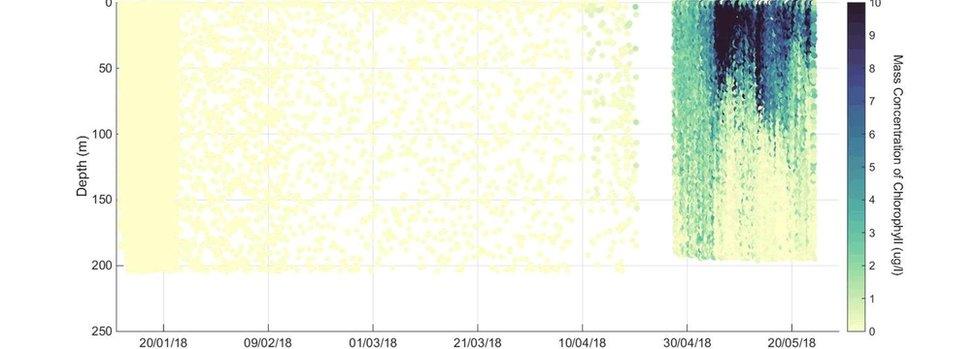Robots detect start to Arctic's marine 'spring bloom'
- Published

A graph the showing increase in chlorophyll in the Barents Sea, marking the start of the Arctic spring bloom
Underwater robots have detected the moment the Arctic's marine ecosystem "wakes up" after the long dark winter season.
Researchers from the Scottish Association for Marine Science (SAMS) in Oban have been investigating the so-called Arctic spring bloom.
Using robots called gliders, they measured chlorophyll, an indicator of the biological content of the water.
Chlorophyll levels "rapidly increased" in mid-April.
SAMS, which has been studying seasonal changes in the Barents Sea, said it was the first time the beginning of the spring bloom had been revealed.
The bloom sees an increase in the abundance of food for microscopic zooplankton, which are a key part in the food chain in the region.
SAMS said the data its researchers gathered could help predict how the Arctic ecosystem will respond to climate change.
'Breakfast time'
Underwater robots called gliders were used in SAMS research work
Marine scientist Prof Finlo Cottier said: "This is the first time there has been a continuous monitoring of the Arctic Ocean environment through the seasons and it has given us a very clear picture of how life responds to the changing conditions.
"We have seen the change from 24-hour darkness in winter to the arrival of spring when the combination of light and warming water allows an explosion of microalgae.
"This is food for tiny zooplankton, which provides energy through the food chain for all sorts of life."
Prof Cottier said the life cycle of zooplankton and the spring bloom had to align for the Arctic food chain to be a success.
He said: "With Arctic sea ice retreating earlier each year, the water is more exposed to the light and mixing.
"Is there going to be a mismatch between food availability and zooplankton life cycles in years to come?"
The scientist added: "It's a bit like waking up at the same hour each morning, only to find that breakfast time has changed."